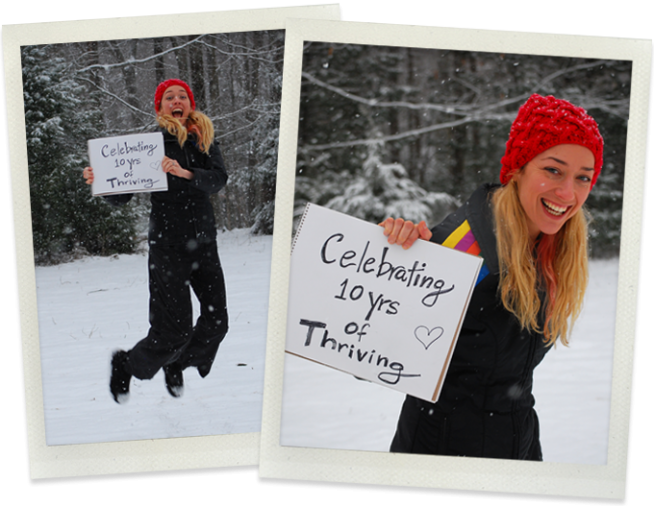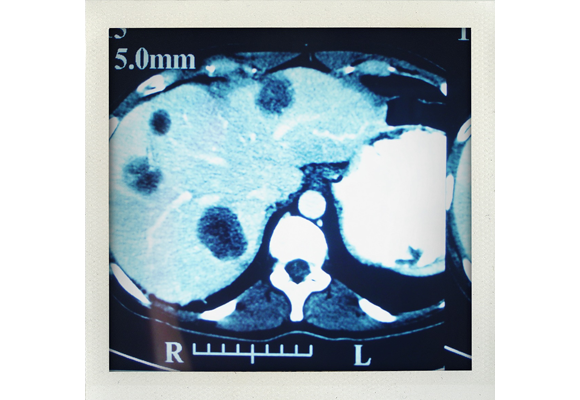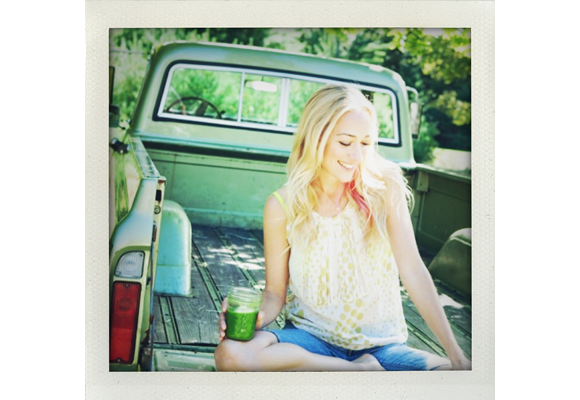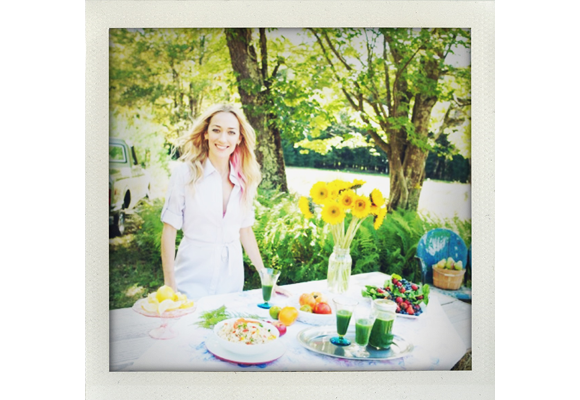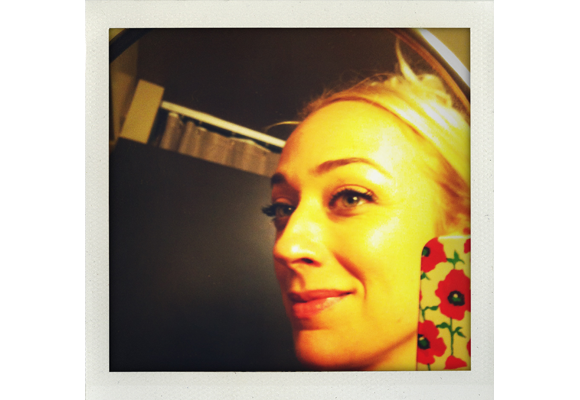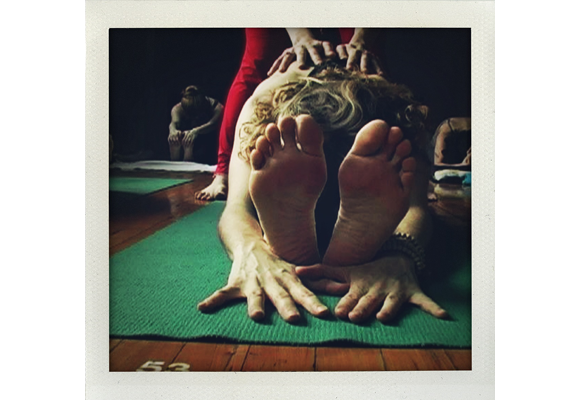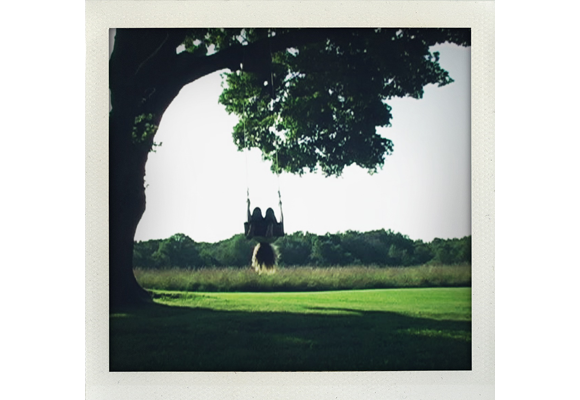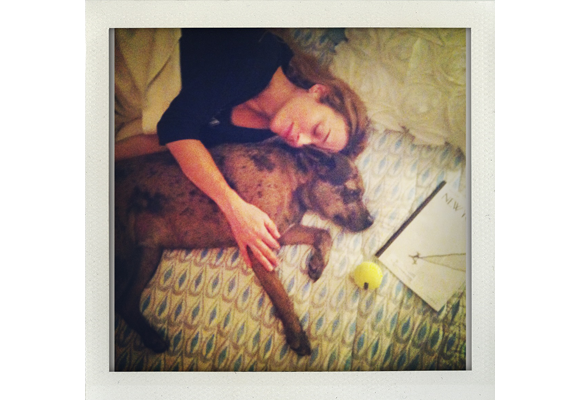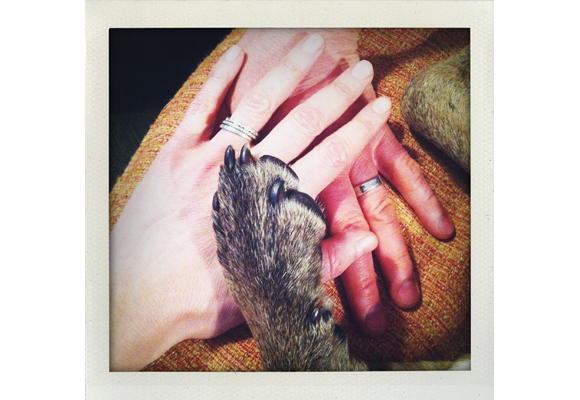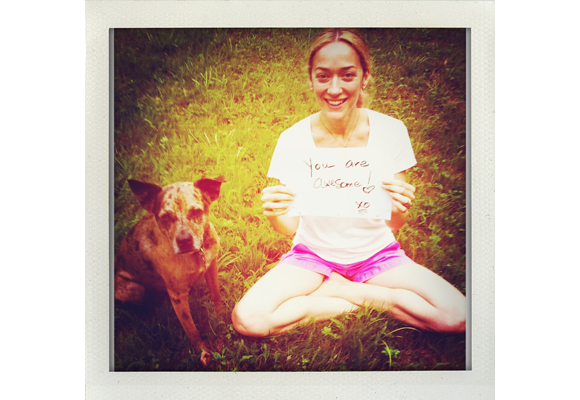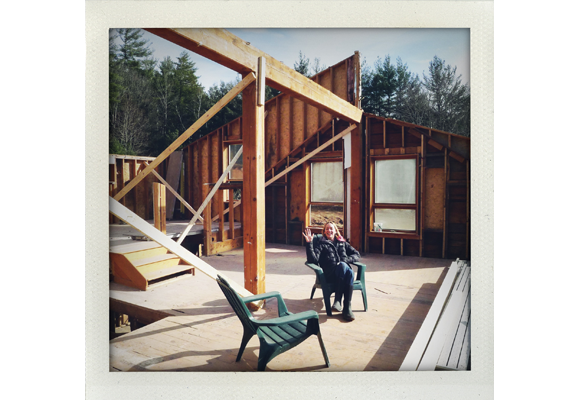Ten years ago, last week, I was given exactly ten years to live.
Stage IV cancer, no cure, no treatment, no options. Thankfully, my expiration date was inaccurate. Like many people diagnosed with cancer, my life drastically changed that day. A decade later, I can honestly say that cancer changed my life for the brighter and better.
In this blog, I’ve reflected on ten tips that helped me and can help you too (whether you’ve been diagnosed with a chronic poop pickle or not). You’ve heard me say many of these things before, but they bear repeating.
As I meditate on the impact that illness has had on my life, I realize I’m a better, more grateful woman today because of cancer. I was asleep at the wheel before cancer shook me awake. And though there’s still no cure (yup, rare diseases don’t get much attention), I continue to live harmoniously with cancer. Once every year and a half I get scanned (hmmm, I think I have one coming up this summer; I forget); otherwise, I just live my life. It’s not always easy, but it is my life, and I love it. For me, cancer isn’t a death sentence, at least not today. My disease is the slow-moving-could-get-aggressive-one-day variety. It’s weird and unknown. Above all, cancer is a spiritual practice that teaches me about faith and resilience. You can learn these skills too. You don’t need cancer to wake you up like I did.
I hope some of these tips resonate with you. And remember, when the going gets tough, take a really deep breath and trust that you will know exactly what to do. You’re smart and your intuition is rock solid. You’ve got what it takes to live an incredible (pinch yourself) life. Don’t wait. OK?
1. Find the best MDs.
If I had listened to the first doctor, I wouldn’t be here today. Thankfully, I was willing to travel and hunt for the best oncologist for my sarcoma. If you’re newly diagnosed (with any medical life lemon), I highly suggest you do the same. Your life is in their hands. Do they have impeccable skill, experience, and access to the latest research? Are they tapped into a network of colleagues who can talk about your case? Your local hospital may not cut it.
It took second, third, and fourth opinions, but today I have a great oncologist and a strong integrative team. They’re kind, compassionate, and treat me like I matter. They’re also very different. My oncologist at Dana Farber Cancer Institute (a sarcoma specialist) understands all the current traditional treatment options for my disease. I still haven’t had any conventional treatment, but should my disease become aggressive, he’d be my first stop. My integrative MDs treat my whole body, not just the symptom. How do they do that? With dietary recommendations, targeted supplements, IVs, stress management tips, and regular tough love. (They often bark at me for working too hard!)
How to find an Oncologist: Start by Googling the top ten cancer hospitals in the U.S. Also, use the resources below to explore the best oncologist for your specific cancer.
- National Cancer Institute’s Office of Cancer Centers
- American Society of Clinical Oncology’s Cancer.Net Cancer Specific Resources
- Cancer Treatment Centers of America (CTCA)
How to find an Integrative MD: Check out the directories below and interview your doctors to make sure they’re the right fit for your healing team.
- Find a Functional Medicine Practitioner
- American College for Advancement in Medicine
- American Association for Naturopathic Physicians
2. Just juice it!
If you really want to turn your health around, start juicing today. As many of you know, daily green juice has been a consistent part of my life for about six years now. Though my disease continues to be stable, I’ve had other health challenges. Without a shadow of a doubt, my green juice practice has been the glue that’s not only held me together, it’s allowed me to thrive in spite of my obstacles.
Juices are hydrating, energizing, nourishing, and medicinal. (But they don’t have to taste like medicine!) And as for the old “I don’t have enough time” excuse, yes you do, and you’re worth it. So stop that nonsense! When you get good at juicing, it only takes about twenty minutes (especially if you prep your veggies ahead of time and rinse off your juicer right away). If you only have a blender, that’s fine, make smoothies. Blend, baby, blend. Cheers!
3. Eat more plants.
I’ll give cancer props for another minute (just one). The little “c” was the catalyst I needed to find a compassionate way of eating and living. In a nutshell, my food philosophy is as follows: Embrace gorgeous greens, beans, legumes, nuts, seeds, grains, sea veggies, fruits, and vegetables galore. Crowd out inflammatory, hormone-filled animal products (even when organic) by filling your plate with plant-strong whole foods. And while you’re at it, pull back on the processed white stuff, especially sugar (it feeds cancer).
If you’re not interested in going full tilt vegan, no worries! Make plants the main dish and animal products the side dish. Reduce your consumption and do your best to avoid factory farm products. For heavenly plant-inspired recipes, check out my cookbook, Crazy Sexy Kitchen.
4. Beauty 911.
We all have our favorite go-to beauty products. Some are luxurious; others are tried and true drugstore scores. Did you know that the average person uses nine personal care products per day containing about 126 chemical ingredients? Many of these chemicals have been linked to increased risk of cancer, infertility, birth defects, hormone disruption, and the list of dangers goes on. Babies, children, teens, adults—we’re all exposed to these chemicals on a daily basis, and there is still much we do not know about their long-term health effects.
Shame on the FDA for not reviewing or approving the majority of personal care products before they go to market. In addition, companies aren’t required to test their products on their own and are allowed to leave hazardous chemicals off their labels. It’s 2013. Why is this ok? Join me in making educated choices about the products we use. Your lashes and longevity will thank you. Use the Environmental Working Group’s tools and resources to get educated and lessen your exposure to toxins.
5. Take ten minutes to move.
I’m a writer, which means that a lot of my day consists of sitting in a chair and staring at a screen while praying for inspiration and clacking at the keyboard. Guess what’s happening in my body as I sit and type? Absolutely nothing. My posture slumps, and my energy wanes. But studies have shown that even short bursts of exercise can have impressive results for your health—decreasing long-term health risks, boosting your immune system, and improving your mood.
You don’t have to have a lot of time or fancy equipment to make a difference. But you do need to get out of that chair and shake your booty for ten minutes (preferably a few times a day). Yoga, dance, martial arts, sex, whatever rings your bell! In our ever-busy lifestyle, everyone can find ten minutes—without fail.
6. Take care of your mind.
Before my diagnosis, I didn’t give my mind a second thought. It was wild and scattered, full of anxiety and doubt. Post-diagnosis, I knew that the chaos in my mind would only harm my body. So I packed my bags and checked into a zen monastery in New Mexico. It was there that I learned about meditation and breathwork, and since then, these basic practices have become my lifeline when I need them.
If you don’t think your anxiety, depression, sadness, and stress impact your physical health, think again. All of these emotions trigger chemical reactions in your body, which can lead to inflammation and a weakened immune system. Learn how to cope, sweet friend. There will always be dark days. Give yourself and your loved ones (because your mental health affects them too) an everlasting gift by learning how to calm your mind. In addition, you may need some professional support. It might be talk therapy, Emotional Freedom Technique (EFT), animal-assisted therapy, group counseling, AA, art therapy, or a combination of approaches. Figure out what works for you, and don’t forget a good ol’ massage from time to time. We hold so many issues in our precious tissues.
7. Adopt a furry friend.
The biggest healers in my life have been my animal companions. As a child, I visited the dairy farm across the street from my home on a daily basis and befriended the cows. From that point on, I’ve developed a visceral connection to all creatures, whether I’m at an animal sanctuary, watching a deer disappear into the woods, or hanging out at home with my rescue dog Lola. My cherished fur children have given me more joy and unconditional love than any human. (And I have a really close family. No offense, Mom!)
Studies show that pets actually boost our immune system, help us live longer, and aid with depression. According to the Centers for Disease Control, pets decrease blood pressure, cholesterol levels, triglyceride levels, and feelings of loneliness. They are wise, kind teachers if you’re willing to open your heart and tend to their needs. If you have space in your home, please consider adopting an animal in need. Every week, we include animal adoptions in our newsletter. If you’re not on our mailing list, whatcha waiting for, zesty hot stuff!
8. Create a new tribe.
Releasing toxic people and embracing supportive, loving people is deeply healing. Are you walking on eggshells with a certain someone? Pretending to be someone you’re not for fear of rejection? It’s time to find out. The quickest way to identify who should stay in your life and who should get the boot is to just be yourself. Who cheers you on? Who boos and brings you down? The answers are clear and so are your choices.
As you rise and acknowledge your light, you’ll find that new, exciting, supportive people start moving your way. When I began walking my talk, I quickly connected with soulful biz-savvy women, innovators, change-makers, thought leaders, activists, and other compassionate, holy beings. My entire life shifted toward that warm energy. Today, my community is an infinite galaxy of inspiration. Not because I shrunk to meet the expectations of others, but because I grew to become the person I wanted to be. You can too. Actually, you must.
9. Unconditional acceptance.
Accepting where we are right now is the path of the mature spiritual warrior. It takes courage to embrace your current situation, to be present and loving toward yourself exactly as you are. Truthfully, why wouldn’t you accept yourself? You are your reality. You are your truth. Can you change? Absolutely! But even talking about change puts us in the future. And while there’s definitely a time for that, building a strong foundation on the now will allow you to consistently love and care for yourself. Stop for a minute. Give yourself props for the hard work it took to get where you are today. Bow to your resilience. Take in your good. If you’re hell bent on strategizing about all that could be better, then you must promise to give equal time to what’s amazing right now.
When I was first diagnosed, my burning goal was remission. Anything else seemed like colossal failure. And even worse, my fault. Ten years later, I’m a master at my own advice. I. Accept. Me. Cancer and all. Does that mean that I’ve given up on my health? Of course not! Acceptance is different from quitting. It means that no matter what happens, you won’t abandon yourself in your time of need. And here’s the part that contributes to your overall well being: Acceptance allows you to rest, renew, and replenish, rather than stress over what isn’t going your way. You are your own angel, treat yourself as such. Stand by your own side as you try new things and spread your wings. Life doesn’t start when “this, that, or the other thing” is resolved. Life is now. Don’t wait it away.
10. Go for it.
Everyone has something special stirring inside. Perhaps you’ve always wanted to open a natural pet foods store. Maybe you’ve dreamed of volunteering for a political campaign or simply going to the Grand Canyon with your kids. I wanted to make a film and write some books. The odds were not in my favor—financially, physically, or emotionally—but I did it anyway. And I’m pretty happy that I did.
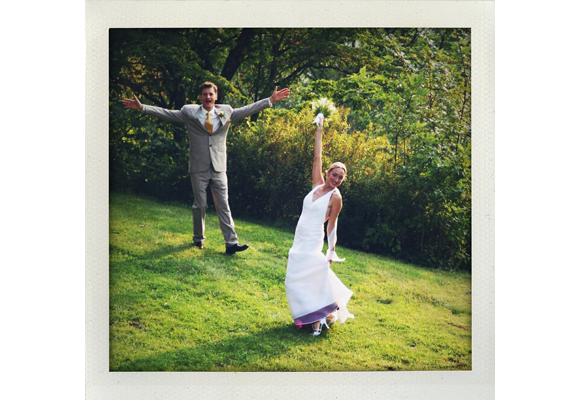
Some leaps will seem small and others sweeping, but they all call us to have faith in ourselves. I found the love of my life after my diagnosis, and though remission was my prerequisite, it wasn’t his. I left a career that was draining my life force and took a gamble on starting my own business. I moved out of the city and worked with my husband to rebuild a broken down farmette because we had a calling to create a sanctuary—a place to rescue animals, grow vegetables, write, live, and give. With each of these steps, I just had to go for it. There are no safety nets. No guarantees. Sometimes we will all fall down, but now that I’ve taken the past decade to embrace these ten tips, I know that I’ll be okay. The risks are worth it because life is worth living. Living like we really mean it. If you haven’t already, I invite you to join me. Because you deserve love, health, and true happiness. And it’s here for the taking.
Keep taking care of yourselves. Your health is a gift.
Kris Carr is a multi-week New York Times best-selling author, speaker, and health advocate. Kris is the subject and director of the documentary, Crazy Sexy Cancer, which aired on TLC and The Oprah Winfrey Network, and the author of the award-winning Crazy Sexy Cancer book series. Her latest books, Crazy Sexy Diet and Crazy Sexy Kitchen, will change the way you live, love, and eat! Kris inspires countless people to take charge of their health and happiness by adopting a plant-passionate diet, improving lifestyle practices, and learning to live and love like you really mean it. Her motto: Make juice not war! To learn more and join the Crazy Sexy Wellness Revolution, check out Kris’ website and follow her on Facebook and Twitter.






